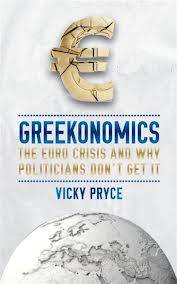Pryce, Vicky, (2012), Greekonomics: The Euro Crisis and Why Politicians don’t get it, Biteback Publishing. Economist Vicky Pryce reflects on the current crisis in the Euro Zone its causes and how Europe has responded, and offers her thoughts on what might and what needs to happen if the Euro is to survive in its current form. She pays particular attention to Greece, the country of her birth, the country first …Read More
If Greece goes…;The impact of a Greek default on Europe and the world economy
Financial Times, (2012), If Greece goes…;The impact of a Greek default on Europe and the world economy, Penguin Books. The Financial Times, the global business newspaper, has led the field with its coverage of the eurozone crisis and Greece’s political and financial chaos. As the chances of a Greek exit from the eurozone grow, the FT’s specialist correspondents and authoritative columnists dissect the potentially devastating consequences for businesses and governments …Read More
A simple and flexible alternative to Stability and Growth Pact deficit ceilings. Is it at hand?
Muscatelli, Vito & Piergiovanna, Natale, (2012), ‘A simple and flexible alternative to Stability and Growth Pact deficit ceilings. Is it at hand?’, European Journal of Political Economy,Volume 28, Issue 1, p.p. 14–26. We model a monetary union where fiscal discretion generates excessive debt accumulation in steady state and inefficiently delayed debt adjustment following shocks. By setting a debt target and raising the political cost of deviating from the optimal pace …Read More
Sovereign Debt Restructurings 1950-2010; Literature Survey, Data, and Stylized Facts,
IMF, (2012), Sovereign Debt Restructurings 1950-2010; Literature Survey, Data, and Stylized Facts, IMF Working Papers, Monetary and Capital Markets Department, Washington. This paper provides a comprehensive survey of pertinent issues on sovereign debt restructurings, based on a newly constructed database. This is the first complete dataset of sovereign restructuring cases, covering the six decades from 1950–2010; it includes 186 debt exchanges with foreign banks and bondholders, and 447 bilateral debt …Read More
Who lost Greece?
Pisani-Ferry, Jean, (2012) ‘Who lost Greece?’ , www.bruegel.org, 21 Φεβρουαρίου. Failing an agreement with its private creditors and public lenders, Athens will not be able to meet the next debt repayment deadline of 20 March. Every day which passes underscores the complexity of the negotiation and ratchets up the risk of it being too late to avert default. Even if, as is likely, a solution is found in extremis, many are …Read More
Debt Crisis and the Welfare State in Greece
Sakellaropoulos, Theodoros, (2012), Debt Crisis and the Welfare State in Greece, www.isa-sociology.org, 12 Φεβρουαρίου. The current Greek fiscal or debt crisis -putting at risk the euro and the modern welfare state- as well as the policies developed as a response to the crisis can be understood only when taking into consideration firstly some specific characteristics of the development model adopted in Greece since the 19th century and secondly those phase …Read More
European Member State Elites’ Diverging Visions of the European Union: Diverging Differently since the Economic Crisis and the Libyan Intervention’
Schmidt, Vivien, (2012), ‘European Member State Elites’ Diverging Visions of the European Union: Diverging Differently since the Economic Crisis and the Libyan Intervention’, Journal of European Integration, Vol. 34, Issue 2, p.p.169-190. In the midst of the EU’s economic crisis and in the heat of the Libyan intervention, immediate concerns have seemingly crowded out consideration of the long-term issues that have been at the center of the major debates, such as …Read More
The Distribution of Full Income in Greece
Koutsampelas, Christos, Tsakloglou, Panos, (2012), ‘The Distribution of Full Income in Greece’, IZA Discussion Papers, N. 6396. Non-cash incomes from either private or public sources can have substantial effects on the distribution of economic welfare. However, standard approaches to inequality measurement either neglect them or take into account only selected non-monetary items. Using data for Greece in the mid 2000s we show that it is possible to incorporate a comprehensive …Read More
Capturing the ECB
Stiglitz, Joseph, (2012), ‘Capturing the ECB’, www.project-syndicate.org, 6 Φεβρουαρίου. Nothing illustrates better the political crosscurrents, special interests, and shortsighted economics now at play in Europe than the debate over the restructuring of Greece’s sovereign debt. Germany insists on a deep restructuring – at least a 50% “haircut” for bondholders – whereas the European Central Bank insists that any debt restructuring must be voluntary.
The Limits of European Integration
Medrano Díez, Juan, (2012), ‘The Limits of European Integration’, Journal of European Integration, Vol. 34, Issue 2, p.p. 191-204. This article summarizes the special issue’s main findings and analytical contributions, challenges some of the arguments, and suggests ways of pushing the research agenda forward. The contributions to this special issue emphasize the penetration of European institutions by actors set on slowing down or reversing the process of European integration and the …Read More






